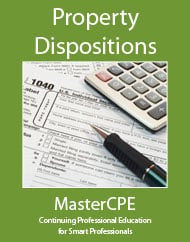Course Information
Property Dispositions
Course Information
| Title: | Property Dispositions |
|---|---|
| Category: | Taxation |
| Field of Study: | Taxes |
| Course Code: | M102 |
| CPE Credits: | 2.0 |
| Price: | 19.95 |
Description
Description:
Tax reform provisions have frequently changed the tax on profits realized from the disposition of real estate. This has forced investors to seek “escape hatches” from fluctuating capital gains taxes. Tax-deferred exchanges permit the disposition of property often with the taxpayer receiving significant cash but without the payment of any tax. Functionally, an exchange is a “bridge” over the normally taxable event of moving from one property to another. This course alerts the practitioner to the different planning opportunities that surround exchanging and also identifies the tax consequences of home sales, foreclosure, repossession, and other real property dispositions. Additional topics of interest include involuntary conversions and at-risk limits.
Delivery Method: Online Interactive Self Study
Level: Overview
Prerequisites: None
Advanced Preparation: None
Course Details
Category: Taxation
Field of Study: Taxes
Passing Score: 70%
Technical Details: Taxes: Technical
For More Detail:
If you are unable to view PDF then right click the mouse and click save link as
Objectives
Objectives:
- Determine gain under the installment method recognizing the application of the unstated interest rules.
- Specify the types of property that qualify for a like-kind exchange and recognize the methods of identifying such property in a delayed exchange including the mechanics for such an exchange.
- Recognize the differences between recourse and nonrecourse indebtedness identifying their impact on foreclosures, determine how various types of property affect the repossession rules of §1038 including basis and gain or loss for both installment method sales.
- Determine how to report gain or loss associated with involuntary conversions, cite the types of payments included in a condemnation award, and specify the types of entities that qualify for exclusion from at-risk limits.
For More Objectives:
If you are unable to view PDF then right click the mouse and click save link as
Profession
NASBA: Yes
QAS: Yes
CPA: Suitable for all CPAs
IRS: IRS credit for Enrolled Agents.
Profession Identifiers: CPA, EA

